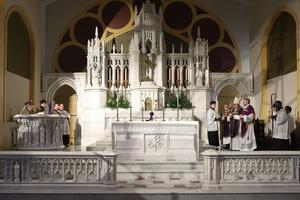NJ Supreme Court Decides Catholic Schools Can Be Catholic — That’s Good News
COMMENTARY: The court’s unanimous Aug. 14 decision marks a victory for all faith-based schools in the Garden State.

After almost a decade of litigation, the New Jersey Supreme Court reached the sensible conclusion Aug. 14 that Catholic schools may require their teachers to follow Catholic teaching. That is crucial to the ability of Catholic schools to carry out their mission of training up the next generation in the faith. But this decision isn’t just about Catholic schools. It’s also a win for all religious groups in the state.
New Jersey is home to all kinds of religious schools — Jewish, Catholic, Muslim, Lutheran, Presbyterian, Episcopalian, Adventist and others. As you’d expect, these schools often ask their teachers to follow a code of conduct to uphold the schools’ religious beliefs and practices. After all, parents rely on these teachers to help “train [their] children in the right way” (Proverbs 22:6).
One such school is St. Theresa School, a Catholic school in Kenilworth, New Jersey, that is a ministry of the Archdiocese of Newark headed by Cardinal Joseph Tobin. Since the late 1970s, it has been run by the Salesian Sisters, who strive to offer their students a faith-centered education inspired by the teachings of St. John Bosco.
To ensure its ministry remains strong, St. Theresa — like all other schools in the archdiocese — requires all of its staff to respect and promote the Church’s teachings. For this reason, all staff must sign an agreement to uphold the teachings of the Catholic Church in both their professional and private lives — serving as examples of the faith to both the students and the community alike. But in 2013, one of St. Theresa’s teachers told the principal that she was violating her contract and Church teaching, and St. Theresa decided not to offer a new contract for the following school year. The teacher sued for discrimination, and nine years later, the case ended up before the New Jersey Supreme Court.
My firm, the Becket Fund for Religious Liberty, argued the case on behalf of Agudath Israel of America, one of the nation’s leading Orthodox Jewish umbrella organizations. We argued that the doctrine of church autonomy — which provides religious groups the power to decide matters of faith, doctrine and internal governance — protects religious schools in making such decisions.
Requiring a religious school of any faith to keep a teacher on staff who publicly violates religious teaching would undermine its ability to carry out its mission of educating future generations in the faith. That is especially so for Orthodox Jewish schools, which are essential to the continuing existence of Orthodox Judaism. How can a Jewish school teach kids the importance of keeping kosher if they see their teacher eating a ham and cheese sandwich at lunch?
In its unanimous ruling for St. Theresa, the court protected the ability of religious schools to decide who teaches and passes on the faith to their students. Applying the religious-liberty protections in state law, the court concluded that a religious group cannot be punished for “following the tenets of its religion in establishing and utilizing criteria for employment of an employee.” Because of that interpretation by the court, St. Theresa can require its teachers to abide by Catholic law in both word and deed.
Importantly, the court rejected calls from groups like the ACLU and Americans United for Separation of Church and State (formerly known as “Protestants and Other Americans United for Separation of Church and State”) to limit these religious-liberty protections to only narrow categories of religious school employees, such as priests. The court broadly protected religious schools’ ability to require all their employees to follow their religious teachings.
This historic decision is particularly important for small religious groups — like many parochial schools and Jewish schools — that don’t have the resources to go to court to protect their freedom. With this decision in hand, they can quickly resolve potential disputes about their religious employment standards and return to their mission of educating children and serving the community — as it should be.
















